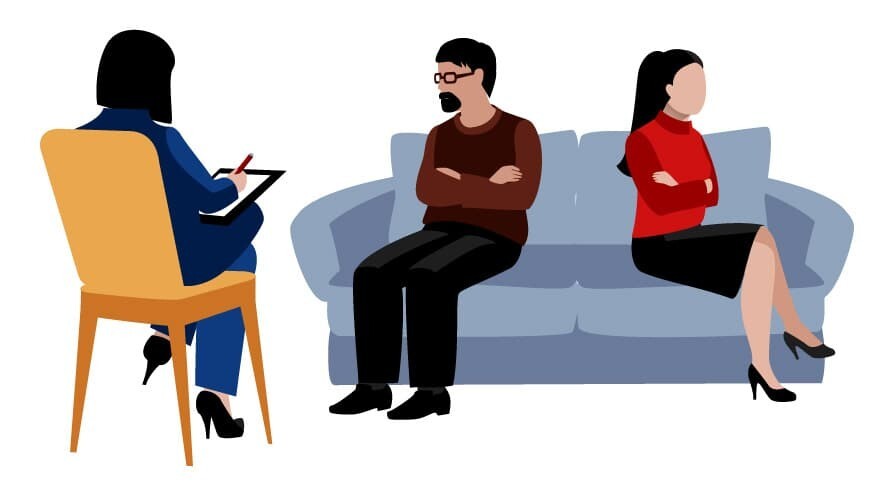Couple therapy services are both exciting and nerve-wracking. Many couples come to therapy as a way to improve their relationship, to find a solution to the conflict they are facing, or to build better communication skills. If it’s your first time considering therapy, you might wonder what happens in the first session. Here is a guide to take you through what to expect so you can approach it with confidence.
1. Introduction to Your Therapist
Any couple therapy first begins with an introduction to your therapist. Most of the time, the introduction is informal. During such a session, they will tell you how they actually conduct their sessions and all the tools they use as a professional in helping both of you. They look for making you feel as relaxed as possible so you are not hesitant to talk honestly and openly.
This part of the session is to ease any nervousness and build a trusting relationship between you and the therapist.
You would feel much more comfortable after you know how the process works.
2. The Purpose of Therapy
The therapist will continue to talk about the intention of the therapy and how much can be achieved via couple therapy services. A relationship can be different and unique each time, which is why the therapist will not focus on blaming but working towards solving the problems so that as a couple you can develop a stronger connection.
Often part of this process is goal setting. Perhaps you will want to improve communication, rebuild trust, or make a major life transition. The goals will be yours and the therapist will adjust the process to meet your needs.
3. Telling Your Relationship Story
It is a good time in the first session to tell a relationship’s history. The therapist might ask:
• How did you meet?
• What was it about each other that first attracted you?
• What are some of the difficulties you have faced?
These questions enable the therapist to know about the dynamics of your relationship and the problems that you are experiencing. It is not history but a context-building process.
Both the partners are allowed to speak freely. The therapist carefully listens to what is shared and puts down comments for use in further sessions. Often, this story telling process opens eyes for the couple as they look at their journey.
4. Key Issues Identification
Once your story is shared, the therapist will help pinpoint the main challenges in your relationship. Common issues might include:
•Communication breakdowns
•Trust issues
•Conflicts about finances, parenting, or household roles
•Emotional distance
The goal is to find out the root causes of these issues. Sometimes couples realize they have been tackling the symptoms rather than the problem. For example, constant arguments over small issues might be a symptom of deeper issues like feeling not appreciated.
5. Ground Rules
With couple therapy, respect on both sides is the prime need. The therapist makes sure that ground rules for any productive conversation are in order. Some of them would be:
• No interrupting while someone was speaking
• Use of “I” statements instead of accusation using “You always do____”
• Refraining from name-calling and criticism
The overall environment will be made healthy where both the persons come to know that the views of each one are respected by the other. In later sessions, the ground established here will ensure the discourses are constructive in their nature.
6. Communication Styles
A good portion of the first session is dedicated to communication. The therapist will be observing how you communicate with each other-how you listen, respond, and speak your minds.
They might even request that you share a recent argument or disagreement.
This is not a judgment. It’s a way to learn how you communicate. For example:
• Are you conflict-avoidant, or do you speak up for yourself?
• Do you freely communicate emotions, or do you never share them?
This is to guide you towards better communication by the therapist.
7. Feeling a Little Uncomfortable (And That’s Okay)
You might feel a bit uncomfortable during your first session. Discussing personal issues before a stranger is quite uncomfortable. Some couples may feel defensive and do not wish to open up.
Your therapist will never force you to tell more than you are ready. They will engage you in a gentle way, and you will start opening up at your pace. Remember, therapy is a process, and progress at first may feel slow.
8. Setting Goals for Therapy
One of the integral parts of the first session is goal setting. The counselor will work with you both in deciding what you wish to get out of the couple therapy services. Some of these goals might include:
•Increased communication
•Resolution of a specific conflict
•Revival of emotional or physical intimacy
Well-set goals give a structure and direction to the sessions. It also allows you to see how you are doing after some time, keeping you motivated and working together.
9. Homework or Exercises
Don’t be surprised if the therapist sends you home with homework following the first session. That might be as simple as:
•Logging your feelings over the week
•Improving active listening in a conversation
•Going out together and doing stuff without distractions
These practices ensure that the skills learned in therapy become part of your daily habits. They also make you contemplate your relationship beyond sessions.
10. Leaving with Hope and Clarity
Most couples are feeling hopeful at the end of the first session. Even when the issues feel insurmountable, having a plan may make them seem less unmanageable. The role of the therapist is to help you step by step with the evidence that change is possible.
You will walk out of the session with a far clearer idea of your dynamics and exactly what needs to change. The relationship is generally much healthier, meaningful, and fulfilling for the majority of people at that point.
Conclusion
Your first session of couple therapy services is your chance at a new beginning. No quick fixes here but building towards a more profound foundation within your relationship. From your story to the goals that you are set to, every aspect is there for you to become a more effective team. Remember that therapy is a journey: every step makes you bring closer to knowing one another even better.














